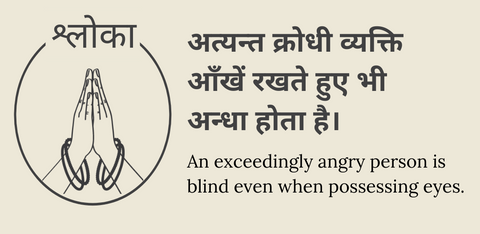Bhagavad Gita Shlokas
The Shrimad Bhagavad Gita - 'The song of God'
Bhagavad Gita has 700 shlokas in 18 chapters on it. It's considered to be one of the main holy scriptures of the religion. These Gita shlokas is a narrative frame work of conversation between Pandava prince Arjuna and his guide and charioteer Lord Krishna. It presents a synthesis about Dharma, theistic bhakti and Yogic ideals of Moksha. Also cover about Raj Yogas, Bhakti and Karma.
Read the amazing Gita Shlokas below:

Anger a natural human reaction when we feel wronged. But this emotion feeds on itself and when left unchecked can keep growing until it consumes us. It is important when facing our own anger to realise its place and proportion - lest it blind us. At the end of the day, we shouldn't allow the same circumstance or person to hurt us repeatedly - once when the wrong happens and then continuously by our harboring us anger over it.

Meaning:
Our intellect or logical mind is important - but we cannot mistake it for the highest authority on everything. There are some truths which cannot be arrived upon through just the intellect - if everything was derivable, there would be no first principles. We all have within us something - call it the soul, a higher power, an inner voice or that last inch where you are truly yourself - that transcends crude logic. The intellect is a tool and just one level of perception available to us, like emotions - so don't limit yourself to just that.

Meaning:
The divine comes to us in many forms throughout our lives, it could be through an idol, through a Guru, through a religion. But it is also through every relationship, every situation and every person that we interact with, where we are given the opportunity to make the choice to be our most Divine self, to choose Dharma over Adharma.

Meaning:
This shloka is also known as the “self-surrender of Arjun” shloka. While Chapter 1 sets the context of the Gita, the true teachings of Shri Krishna start after shloka 7. The importance of this shloka is in the word “prapanam” meaning surrender, where Arjuna, after being confused about dharma, whether he should fight or not fight, surrenders himself at the feet of Lord Krishna and asks for his guidance.

Meaning:
It is the contact of the senses, mind and intellect with the world that creates this world of dualities in the form of happy/sad, pleasure/pain, fame/infamy etc. And just as one comes, so will the other and they are all subject to complete transience, and none of these dualities are ever permanent in this world. So Shri Krishna reminds us to always bear all dualities with strength and remind ourselves that “this too shall pass.”

Meaning:
What do we have to fear when the True Self can neither be destroyed nor created, is eternal and is independent of the existence of the body. To think that we’re something beyond the body seems abstract, yet if we are the body, which part of the body are we? The Soul/Energy/Divine, whatever one chooses to call this power that lies within us, every spiritual text emphasizes the existence of this powerful force.
